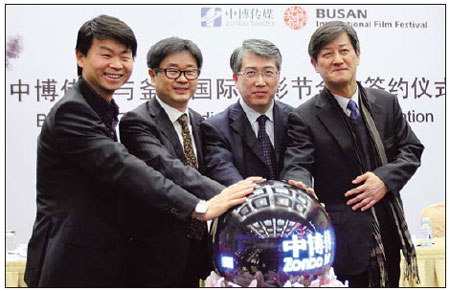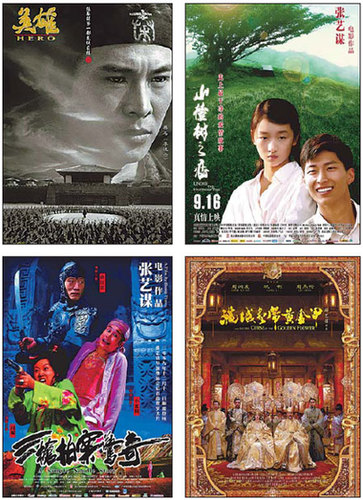Movie
S. Korea's the reel deal
Updated: 2011-03-24 07:54
By Liu Wei (China Daily)
|
(From left to right) Zonbo Media's CEO Chen Weizhong, and chairman of the board of directors Chen Weiming, pose for a photo with La Peikang, vice-president of the State Film Bureau of China, and Lee Yong-kwan, chairman of the Busan Festival. Jiang Dong / China Daily |
A private media company sees the country as a promising market for Chinese films and believes cultural similarities augur well for its ambitious plans. Liu Wei reports.
While many see the United States?market as a touchstone of the clout of Chinese films, Chen Weiming has his sights set on the South Korean market, which he believes is more accessible thanks to the country's cultural affinity with China.
Chen's Zonbo Media, a 12-year-old film production and distribution company, has cooperated with the Busan International Film Festival, a top Asian film gala held in the South Korean city, to set up a joint venture named Zonbo-Balcon.
The new company will run four theaters in South Korea that will screen both commercial and art films from China, other Asian countries and the US.
|
Four of Zhang Yimou's movies have been released in South Korea. |
Chen's ambitious plans also include a theater chain of 50 cinemas and a distribution network for Chinese films in South Korea.
"Chinese flicks take up 2 to 3 percent of the South Korean film market. I hope that when the theater chain is completed, the figure will increase to 5 to 10 percent," Chen told a press conference on Saturday attended by Lee Yong-kwan, chairman of the Busan Festival, and La Peikang, vice-president of the State Film Bureau of China.
South Korean film industry researcher Fan Xiaoqing has hailed the new company. She says film exchanges between the two countries are far from enough, although recent years have seen greater cooperation in post-production. In Feng Xiaogang's The Assembly, for example, the special effects team from South Korea played a significant role.
"China screens about three South Korean films in the theaters every year, while South Korea shows about five Chinese flicks. These are too few for audiences in both countries to get a full picture of the film scene on both sides," she says.
Of the Chinese films released in South Korean theaters, most are blockbusters by acclaimed directors, such as Zhang Yimou, Chen Kaige and Feng Xiaogang.
"Hopefully the new company will bring more medium- and small-budget Chinese films to South Korean audiences," Fan adds.
Chen shares Fan's optimism and points to the 2010 box office in South Korea of 8 billion yuan ($1.2 billion).
"With the theater chain and distribution network, Chinese films can earn 400-800 million yuan of this," he says.
His confidence is not without basis. Zonbo has been promoting China-South Korea film cooperation for years. It produced South Korean director Hur Jin-ho's A Good Rain Knows. Set in Chengdu, capital of Sichuan province, it saw high-profile screenings at the Venice and Busan festivals in 2009.
The company has also invested in several South Korean films, such as Himalaya and Crying Fist.
And in 2002, Chen distributed Zhang Yimou's Hero in South Korea.
It was not an easy decision at that time, when China's annual box office was just 900 million yuan, one tenth of that in 2010. When most directors were struggling to increase their share of the box office pie, Zhang and Chen were looking for a bigger pie.
Zhang embarked on a path that was to be followed by many mainland filmmakers - making big-budget period kungfu blockbusters with a star-studded cast.
The kungfu genre and the A-list cast in such films have helped extend the box office draw to other countries in Asia, such as Japan, South Korea and Singapore.
Chen took up the distribution of such films in South Korea and his decision has been vindicated.
"The two countries share many traditional beliefs and values, so South Korean audiences do not find it difficult to understand Chinese films," he says.
Hero entered South Korean mainstream theaters and grossed 150 million yuan. According to Fan Xiaoqing, it was among the top 10 films in the country that year.
Chen also distributed Zhang's later works, such as Curse of the Golden Flower, A Simple Noodle Story and most recently, Under the Hawthorn Tree.
Some of them did not do as well as Hero, though, which Chen attributes to the absence of a powerful distribution network.
When Zhang's A Simple Noodle Story was screened in South Korea, Chen suggested the film should be dubbed in a local dialect to match the film's slapstick tone, but his idea was not accepted.
It was in order to have a bigger say in distribution that he decided to set up the joint venture Zonbo-Balcon.
"We know our films better," he says. "If we can control the distribution channels, we can come up with more effective and flexible strategies. Having our own cinema chain will also enhance the films' competitiveness."
The new company will benefit not only Chinese filmmakers but also South Korean audiences, Lee of the Busan festival believes.
"Half of the films South Korean audiences watch are local productions, 45 percent are Hollywood flicks, and the rest are films from other countries," he says. "And most people like commercial blockbusters by celebrated directors. Many quality art films never make it to the theaters.
"Now, audiences will have access to more choice," he says.
E-paper

Green light
F1 sponsors expect lucrative returns from Shanghai pit stop
Buying into the romance
Born to fly
Light of hope
Specials

Share your China stories!
Foreign readers are invited to share your China stories.

No more Mr. Bad Guy
Italian actor plans to smash ‘foreign devil’ myth and become the first white kungfu star made in China.

Art auctions
China accounted for 33% of global fine art sales.


